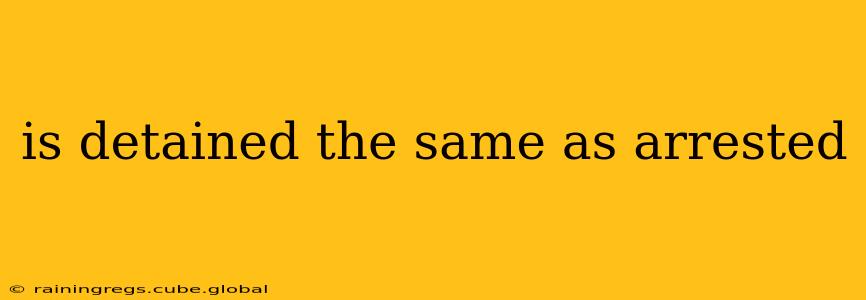The terms "detained" and "arrested" are often used interchangeably, leading to confusion about their legal implications. While both involve restricting someone's freedom, there are crucial distinctions between detention and arrest. Understanding these differences is vital, especially if you or someone you know has been subjected to either.
What is Detention?
Detention is the temporary holding of a person by law enforcement. It's a less formal process than arrest and typically involves a shorter period of confinement. Detention can occur for various reasons, including:
- Investigative purposes: Police might detain someone for questioning to gather information about a crime. This usually happens in a less restrictive environment than a jail cell, perhaps a police station interview room.
- Immigration issues: Immigration authorities may detain individuals suspected of violating immigration laws. This detention can range from a few hours to extended periods depending on the circumstances.
- Witness protection: In rare cases, witnesses might be detained temporarily for their safety.
- Mental health evaluations: Individuals exhibiting concerning behavior might be briefly detained for a mental health assessment.
Key characteristics of detention:
- Temporary: Detention is usually short-term, lasting hours rather than days or weeks.
- Less formal: The legal requirements for detention are less stringent than for arrest.
- No formal charges: Detention doesn't automatically mean someone will be charged with a crime.
What is Arrest?
An arrest is a more formal process involving the taking of a person into custody based on probable cause that they have committed a crime. This is a significant step in the criminal justice system.
Key characteristics of arrest:
- Formal charges: An arrest usually precedes the filing of formal criminal charges.
- Legal requirements: Police must have probable cause (reasonable belief that a crime has been committed and the individual committed it) to make a lawful arrest.
- Miranda rights: In most jurisdictions, individuals being arrested must be informed of their Miranda rights (the right to remain silent, the right to an attorney, etc.).
- Booking process: After arrest, individuals typically undergo a booking process that involves fingerprinting, photographing, and recording personal information.
- Longer detention: Detention following an arrest is often considerably longer, potentially leading to incarceration pending trial.
What are the Differences Between Detention and Arrest?
The main differences boil down to the formality of the process, the legal grounds, and the duration of confinement:
| Feature | Detention | Arrest |
|---|---|---|
| Formality | Less formal | More formal |
| Legal Grounds | Reasonable suspicion (often) | Probable cause |
| Charges | No immediate charges necessarily filed | Formal charges usually follow |
| Duration | Typically short-term (hours) | Can be significantly longer (days, weeks, etc.) |
| Miranda Rights | Not always required | Usually required |
Can Detention Lead to Arrest?
Yes, absolutely. Detention can serve as a preliminary step in an investigation. If during detention, law enforcement gathers sufficient probable cause, they can formally arrest the individual. Conversely, someone can be detained and then released without being arrested.
What should I do if I am detained or arrested?
If detained or arrested, remember these key points:
- Remain calm and polite: Cooperate with law enforcement, but assert your rights.
- Request an attorney: You have the right to legal counsel. Exercise this right without delay.
- Don't make statements without an attorney: Anything you say can be used against you in court.
- Document everything: If possible, record the date, time, location, and names of officers involved.
Understanding the nuances between detention and arrest is crucial for protecting your rights. If you have questions or concerns, it is always advisable to seek legal counsel.
